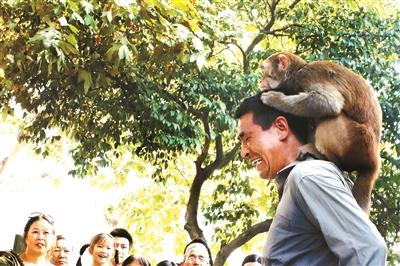Traditional monkey circus show faces dilemma
 0 Comment(s)
0 Comment(s) Print
Print E-mail Xinhua, October 30, 2014
E-mail Xinhua, October 30, 2014
|
|
| Wang Zhongxu, a trainer from Xinye, plays with one of his monkeys on a street. |
Modern challenges
Wang Zhongxu, a trainer from Xinye, regularly plays with his monkeys on the streets in Jingmen City of central China's Hubei Province. When spotting an urban management officer or chengguan, he's forced to quickly pack up his belongings and relocate. Often, they're coming for him.
As a monkey performer, he has grown used to the vagrant lifestyle.
Railways, bus stations and vegetable markets are the ideal places for the circus. But as cities move their railway and bus stations to the suburb, and vegetable markets are gradually replaced by closed-in supermarkets, "finding a proper vacant lot that can attract spectators but avoid chengguan is very difficult," he said.
Often difficult to obtain, wildlife transportation licenses are another sore point for monkey trainers in Xinye.
The license needs to be approved by both provincial forestry departments in departure and arrival locations because some monkeys are under state protection, said Peng Zhenfeng, an employee at the county's forestry bureau.
"We accept the application from performers, send it to the municipal government, which then sends it to provincial government," he said.
It is not easy since performers usually embark on their journey carrying just a backpack, usually during the off season for farmers.
"They don't have time to wait and often don't know where they will go next. They are like nomads," said Zhang Junran, head of the Monkey Art Association of Xinye County.
As the public becomes more aware of animal protection, popularity for the tradition is also waning.
Earlier this month, two men from Xinye who forced monkeys to perform tricks were expelled from downtown Changsha, central China's Hunan Province, after a resident called the city's police, believing they abused the animals.
"Monkeys are tamed, bred and used as performance tools. It is inhumane and harmful to animals," Chinese animal welfare advocate Mang Ping wrote on microblog Sina Weibo.
Such criticisms are a source of dismay to performers.
"Our monkeys are handed down from the older generations of the family. We treat them as family members," said Zhang Zhijie, a monkey trainer in the county.
Limited performing space, misunderstanding and lack of funds have pushed many people in the county to find other means of income.
Previously, nearly 10,000 villagers were monkey trainers in Xinye, but now the number has decreased to 300, Zhang Junran said.
After hearing four predecessors were detained by police in Heilongjiang Province, 20-year-old Yu Cheng, the youngest performer in the county, has decided to change his profession.
"I don't know. Perhaps I will find a job in some bigger cities like other young people," Yu said.
In order to gain public acceptance of the ancient tradition in a new era, the local government and performers are working on a string of measures.
"We will let trainers wear uniforms with serial numbers and a complaints hotline phone number on it," Zhang Junran said. "We hope to make the performance more professional and show the true face of the Chinese monkey circus to people."
"He could dance and shoot baskets," an emotional Bao Fengshan told Xinhua when talking about his departed monkey Adan.
"I don't believe the monkey performances passed down by my ancestors violates the law in today's civilized world," he said.







Go to Forum >>0 Comment(s)